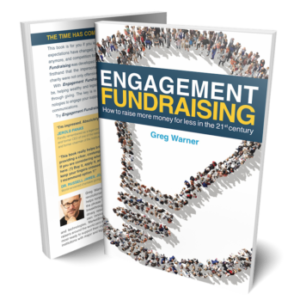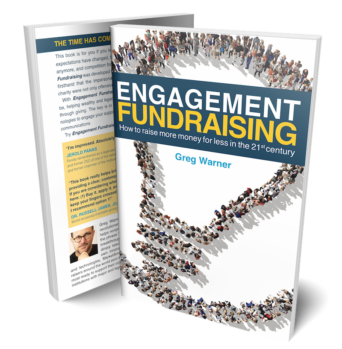We use cookies to ensure that we give you the best experience on our website. By continuing to use this site, you agree to our use of cookies in accordance with our Privacy Policy.
 Login
Login
Your Role
Challenges You Face
results
Learn
Resources
Company
A pep talk for fundraisers like you!


We are going to get through this, and history proves it.
For many of us, this is not the first economic downturn we have seen in our careers.When we look at the Great Recession of 2008, giving declined only slightly.
The Giving Institute Foundation (Giving USA) found that total giving dropped by 7.0% in 2008 and by another 6.2% in 2009. However, as a percentage of GDP, giving fell minimally, dropping from 2.1% in 2008 to 2.0% in 2009, 2010, and 2011.
Furthermore, most larger organizations did not go out of business during the Great Recession. According to the Urban Institute, during the Great Recession (2008-2012), smaller organizations disappeared at a high rate but organizations with revenues of $1 million and above were no more likely to go out of business than during the period prior to the Great Recession (2004-2008).
In fact, Steve MacLaughlin, author of Data Driven Nonprofits and VP of Product Management at Blackbaud, recently shared via The Agitator that when you look at a sample of large organizations in the United States during this period, you will see that existing donors were retained at similar levels well into the last recession. In other words, despite a decline in new donors, loyal ones continued to give. However, the decline in donors might have occurred due to decreased investment in new donor acquisition.
Your donors are worried about YOU.
Just the other day, I was talking to staff at an organization in the arts and culture space that had to close their doors until further notice by government mandate. Their team is made up of rockstars, by the way, and they did not hesitate for a moment. They called every single person in their portfolios to ask if they would donate to fill the hole resulting from ticket refunds. The vast majority did.
Interestingly, after engaging with their organization’s supporters so intimately, the staff were pleasantly surprised to find that, despite facing many health and financial concerns, their donors were:
- Quite worried about them (the staff)
- Thrilled to have been given an opportunity to make a difference
No one wants to feel powerless. And all of us are sitting in our homes worrying about our loved ones, worrying about our future, worrying about all the people out there that are struggling, and we are mostly feeling powerless. Your donors feel the same way. They can’t personally go out and deliver meals, or care for the sick, or come up with the next medical breakthrough. But you can! And, through you and your organization or institution, your donors can make it possible.
Your job is to give them a chance to feel empowered.
All around us we are seeing major donors stepping up to help nonprofits through these turbulent days:
- Arthur Blank, a co-founder of Home Depot and owner of the Atlanta Falcons, announced he would be donating nearly $5.4 million to COVID-19 relief efforts.
- Bill and Melinda Gates pledged to donate $100 million through their foundation to fight the global pandemic.
- Dallas Cowboys tight end, Blake Jarwin, recently agreed to a three-year extension worth up to $24.25 million, a portion of which he has pledged to donate to Oklahoma State University to help workers impacted by the cancellation of spring sports.
- Nets’ basketball player, Kyle Irving, announced he would be donating $323,000 to Feeding America to help those in marginalized communities in the NYC area put food on the table during these difficult times.
- More than 100 athletes have donated memorabilia to the “Athletes For COVID-19 Relief” fund, which benefits the Center for Disaster Philanthropy’s COVID-19 Response Fund.
The list goes on and on.
Clearly, the world needs nonprofits right now.
Nonprofits were created to heal the wrongs in our world and just about every single one has something to offer during these challenging times. If you are in healthcare or humanitarian aid, you already know this. For weeks, you’ve been caring for the sick flooding our hospitals and doctor’s offices, feeding families whose primary provider was just laid off, and so much more.
But every one of you will play a part in the months to come:
Schools and universities will provide connection and a feeling of normalcy to this generation of young people as your staff and teachers continue to reach out to students who are now learning from home.
Faith-based organizations will bring peace to wounded souls, and provide aid to vulnerable members of our society.
Animal welfare groups will ensure that our furred, scaled, and feathered friends are cared for as their owners face financial difficulties.
Those that champion the arts will help us make sense of the tragedy, bringing beauty and comfort to communities that are broken and distressed.
Historic preservation organizations will remind us of the hardships we’ve faced in the past and how adversity has only proven the resilience of the human spirit.
Conservation and environmental organizations will continue to advocate for the health of our planet, ensuring the wonder of nature is there to uplift and inspire us as we move forward.
I could go on. Your missions are diverse and nuanced, but every nonprofit will find its place to help.
Your donors need fundraisers now, too.
You have the power to make your donors feel good, if you remind them that they can be the heroes in this situation.
They’ll feel good if you show them how they can find meaning in their lives during this desperate period of distress.
They’ll feel good if you tell them stories about others, like them, who are stepping up to partner with your organization to make a difference.
They’ll feel good if you engage with them, find out how they are feeling, and — if appropriate — offer them opportunities to provide support.
In the coming days, I’ll outline the path forward for you.
No, I won’t tell you to double-down on more junk mail or spam. And I certainly won’t tell you to depend even more on your annual events.
Instead, I’ll remind you that Engagement Fundraising was engineered for our current crisis.
So, stay tuned.
And if you want to listen to my book on the subject, just click here to get the audio version for free. Or email me at info@imarketsmart.com for a digital version perfect for an iPad, computer or phone.

Get smarter with the SmartIdeas blog
Subscribe to our blog today and get actionable fundraising ideas delivered straight to your inbox!

[…] I like how Greg Warner, our strategic partner at MarketSmart, puts it in his recent blog: […]